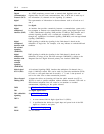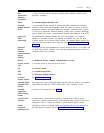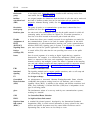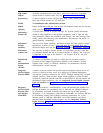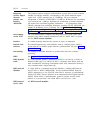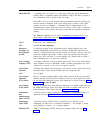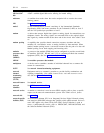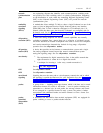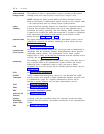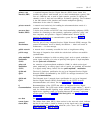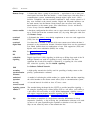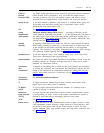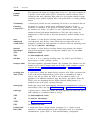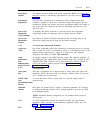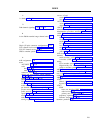
GL-16
GLOSSARY
packet-switched
transport mode
packet
switching
packetized data
PAD
parameterized-
service format
partitioning
PAM
PC/PBX
Connection
PCM
PDM
PDS
preferred call
reference
premises
distribution
system (PDS)
PRI
The condition in which a communications system or network provides packet
switching of the user’s data. See also circuit-switched transport mode.
NOTE: Although the ISDN protocol defines the Packet Switched Transport
Mode and the Generic 2 administration software provides for this transport mode
— the switch hardware does not currently include a packet interface.
A data transmission technique whereby user information is segmented and routed
in discrete data envelopes called packets, each with its own appended control
information for routing, sequencing, and error checking. Packet switching allows
a channel to be occupied only during the transmission of a packet; on completion
of the transmission, the channel is made available for the transfer of other
packets. See also BX.25, packet, and X.25.
The digital multiplexed interface (DMI) mode-3 data-channel protocol used in
virtual-circuit service for the statistical multiplexing of data streams. See also
LAPD Packetized Data.
See packet assembler/disassembler.
One of two network-specific facility (NSF) service types that are administered in
conjunction with the Automatic Alternate Routing/Automatic Route Selection
(AAR/ARS) routing patterns. The parameterized service format requires
multiple bytes to convey all the necessary information about the requested service
or facility. See also binary service format.
The capability to impose restrictions on each tenant’s users to limit their access to
only a specified subset of the communications system’s facilities and services.
Partitioning allows a multitenant system to comply with state or federal
regulations and to provide security and cost allocation between tenants. See also
tenant service.
See pulse-amplitude modulation.
AT&T communications-management software for the MS-DOS
®
and UNIX
®
operating systems that integrates a digital multifunction telephone and a PC with
a communications system via a Digital Communications Protocol (DCP)
interface to provide enhanced voice and data communications services.
See pulse-code modulation.
See processor data module.
See premises distribution system.
See channel negotiation.
A cabling system that consolidates wiring for a customer’s on-site and remote
telephones and data terminals, and channels transmissions to the communications
system.
See primary rate interface.



